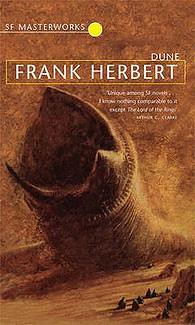I’m only a day late, so catching up on the timetable for the Dune read. Beware of spoilers up to the end of section 2, and if you are leaving a comment please don’t spoil anything beyond that. This weeks questions are:
- Was Liet’s identity a surprise? who do you think he really works for?
- What do you think of the Fremen culture? is this a culture you think you’d enjoy spending some time with?
- What do you think of Count Fenring’s unusual verbal mannerisms?
- This is a far future empire with very little in the way of computerization. Information is often passed down orally, and schools (such as the Mentats and the Bene Gesserit) have formed to train young people in memorization and information processing. What are you thoughts on a scifi story that is very “low-tech”? Does that sound like a feasable future? a ridiculous one?
- If you found the beginning of the book tough to get into, do you find that you’re having an easier time with the middle portion, now that all the “set-up” is complete?
- The center portion of the book is still pretty dialog heavy, but what I’ve noticed is the subtlety of the dialog. Things left unsaid are often more important than things that are said. What do you think of that as a stylistic choice? does it make the dialog more interesting? less interesting?
- Dune was written in the 60’s. Does it feel dated to you? How does it compare, writing style-wise, to more contemporary science fiction you’ve read?
- If you’ve never read this book before, where do you think the storyline is headed?
And my answers:
- Was Liet’s identity a surprise? who do you think he really works for?
I don’t think his identity was a suprise in that it was hinted at throughout his appearances in the first section. It was clear that he wasn’t *only* his official role, so that wasn’t a shock at all to find out that he was Liet.
I don’t think he knows who he really works for. His death scene/hallucination seems to suggest that the plan to change Arrakis started before Liet, I’m not sure it it started with his father or even before that, but I’m pretty sure that they are ones who have taken advantage of, and alterered the religious aspects left by the Missionaria Protectiva and that is why Jessica feels that it has been changed. Whether or not that means he works for the Freman I’m not sure. For their long-term advantage? yes, but for those living in the present? I don’t know. - What do you think of the Fremen culture? is this a culture you think you’d enjoy spending some time with?
It is a very different culture from what I’m familiar with that is for sure. We do *not* have a problem with water, in fact we tend to complain about how much we get, and yet it is one of the absolute neccesities for life so maybe we should be more thankful. I don’t think that I would like to meet a Freman, I’m far to water-soft and addicted to an easy life I’m afraid.
I always got the impression that Robert Jordan had used the Freman as part inspiration for his Aiel and I can certainly see a lot of similarities between the two cultures, although there are differences there too. - What do you think of Count Fenring’s unusual verbal mannerisms?
To be honest I found reading them a chore and a distraction. And I would have liked if it could have been gotten across in a different manner. However I did like the Count & his wife, although again it shows how the role of women seems to be as brood mares in the Bene Gesserrit master plan. Willing brood mares perhaps, and I guess that they see men as no more than stallions either. Their whole preoccupation with breeding humans is quite off putting. - This is a far future empire with very little in the way of computerization. Information is often passed down orally, and schools (such as the Mentats and the Bene Gesserit) have formed to train young people in memorization and information processing. What are you thoughts on a scifi story that is very “low-tech”? Does that sound like a feasable future? a ridiculous one?
I really like that aspect, harnessing the mind to its fullest potential, but I’m sure that if it were to be done it would be helped by implants and the like. I’m not sure it is a “low-tech” society. After all the still-suits the Freman use are technology in every day use. I think maybe I would describe this as soft sci-fi rather than hard. It isn’t focused on the technology but on the people and the society. - If you found the beginning of the book tough to get into, do you find that you’re having an easier time with the middle portion, now that all the “set-up” is complete?
I didn’t find the beginning a chore at all, and this middle section has really taken off as well. - The center portion of the book is still pretty dialog heavy, but what I’ve noticed is the subtlety of the dialog. Things left unsaid are often more important than things that are said. What do you think of that as a stylistic choice? does it make the dialog more interesting? less interesting?
In many ways the use of dialog, seems to me, to distance me from what the characters are thinking. Herbert doesn’t give us a huge amount of what is going on inside people’s heads. A little here and there, but it is more hints and then dialog to show us. Or maybe thats just my interpretation? It makes the story interesting in that I’m not sure entirely how to relate to some characters - Dune was written in the 60’s. Does it feel dated to you? How does it compare, writing style-wise, to more contemporary science fiction you’ve read?
It seems to me a little dated in the way the women are written. But then again a fair amount of modern sci-fi is let down in that department as well, and there are women characters with real strength here so I have to give Herbert credit there.
For the rest of the book, I don’t think that it feels dated at all. I do think that a more modern sci-fi author may have tried to make more use of technology, implants and the like as I mentioned in the low-tech question, or perhaps being tied into a internet-like computer, but the lack of anything like that isn’t a fault. I’ll admit that I don’t read a huge amount of science fiction, fantasy is more my genre so maybe I’m the wrong person to compare the styles. - If you’ve never read this book before, where do you think the storyline is headed?
Towards a whol heap of spin-off novels ;)
Honestly, I have an idea from the picture book I read years ago so don’t want to risk spoiling anyone else.
I have to say that I am really enjoying Dune so far, and can see why it is still a popular book.
Other answers to the questions can be found on the following blogs:
Stainless Steel Droppings ; Beauty is a sleeping cat ; 50 year project ; Little red reviewer ; Gypsi ; All that Shaz





I must admit I liked the Bene Gesseritt a lot at the beginning but much less now. They are really manipulative. In this regard the Fremen seem refreshingly direct.
I'm glad you didn't give away the ending… I'm curious to see how it will end altough I find part III a bit of a chore again.
I like what you say about it being soft-tech. There is advanced technology. I'm really not an expert in sci-fi, I'm glad there is more mental evolution than technological advancement.
I think one of the problems I ave with this book is that I find it lacking in psychology. We know occasionally what the people think but not what they feel.
Caroline´s last blog post ..Frank Herbert: Dune (1965) Book II Muad’Dib
They are manipulative, and so concerned with breeding, leaves a bad taste in my mouth :)
And yes, you've said it perfectly, we know what the characters are thinking but not what they are feeling.
I find the whole Bene Gesserit plan to, in essence, genetically engineer a Messiah (through their breeding plans and planted prophecies) to be very interesting, especially in light of what appears to be happening, which is the prophecies actually coming true. I can't get a grasp yet on if the prophecies were originally believed to be true and perhaps Jessica is just cynical about her order because of her own issues or if it was always meant to be something that was just legend used to control others and to give the Bene Gesserit a place of power in the culture. Either way it is all very interesting.
I liked the Count and his wife as well, they are all nice and schemey, but I hate the way the secret language was handled. I don't relish seeing more of them because of the way Herbert writes their speech, but they are such deliciously scheming characters that I also do want to see more of them.
I think we get a pretty good idea of what Paul is thinking and feeling and Jessica as well. Not enough that we are completely inside their heads and then are not surprised by the way the story will progress, but there is more internal thought dialogue than I am used to in my reading. Or at least it seems that way.
Interesting, but creepy :) Or at least that's how I feel about them. Can see why other people in the Dune 'verse dislike the Bene Gesserit.
I do find the religion/planting of superstition to be a nice touch though. It is something I've come across, but usually it is more accidental than planned I think.
ahh the joys of space opera – everyone is manipulating everyone else, everyone is scheming for something in one fashion or another, everyone has their own goals.
everytime i read this book, I enjoy it more!
I'm not sure if it is one I will reread, but I can see that it would reward a second look.
the whole water thing with the fremen is great! just as you say, it's so different to our current situation.
i love good herbert is at getting us to understand how precious water is on arakeen. it really helps you get into that world and understand the psychology of the fremen.
It does, doesn't it? And in many ways I think we should be that careful about water, even if it falls from the skies here. No sense wasting stuff just because we can.
I hadn't thought about it until you pointed it out, but there isn't a lot of thought mentioned, most everything IS in dialogue.
Oddly enough, I see the Bene Gerrit as being a rather progressive view of women, more so than previously found in novels anyway, as they are aware of their purpose and are the ones making the decisions for the genes that need to be retained, etc and not having that forced on them by males. Still creepy, though. :P
Gypsi´s last blog post ..Dune Group Read, Round 2
Hmm, I suppose they are the ones in charge, but yes, still creepy :)